The first unconference I've attended is BarCamp Malaysia in 2008. The first legit conference I've attended is RedDotRubyConf 2011. Amazingly for the past 2 years, I've attended 16 conferences, organized in 8 cities and 6 countries:
- EmberConf 2014
- Front End Ops Conf 2014
- CSSConf EU 2014
- JSConf EU 2014
- Web Directions South 2014
- RedDotRubyConf 2014
- CSSConf.Asia 2014
- JSConf.Asia 2014
- FOSSASIA 2015
- Codemania 2015
- Beyond Tellerrand Düsseldorf 2015
- RedDotRubyConf 2015
- ReactEurope 2015
- An Event Apart: San Francisco 2015
- CSSConf.Asia 2015
- JSConf.Asia 2015
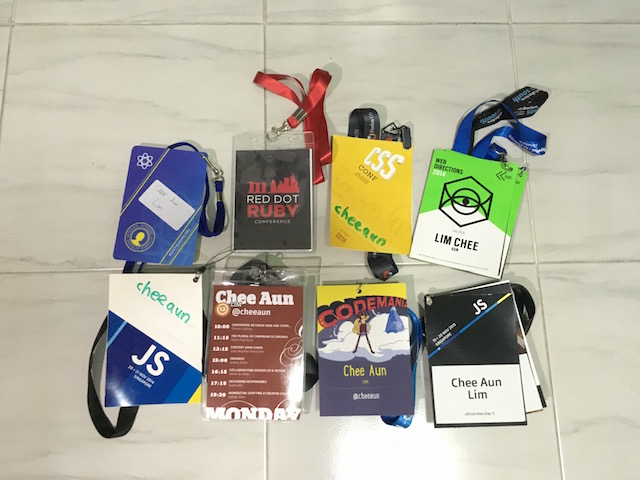
My colleagues and friends start to call me a professional conference goer. And I'm not even a speaker, just a normal attendee. I go to conferences as an excuse to travel around too.
I was inspired. I've seen people traveling to Singapore all the way from Hong Kong or UK, just for a conference. And I wanted to do the same thing.
So I did.
The response that I get all the time is "Wait, you fly all the way from Singapore just for this conference?". So much disbelief and surprise that sometimes I think twice why I'm doing this. It's sort of more unusual because not many people in Asia do what I did, traveling outside Asia for a conference and vacation at the same time. But then, there's no point thinking about it anymore since I'm already there.
At first, I don't know exactly why I'm so fascinated about going to conferences. It took me a while to gather the reasons that sort of manifested along the way since my first ever conference.
I always joke around with my friends that I go to conferences only to get free lunch and swags. But there's more than that.
The talks
I love seeing how the speakers talk. The way they pronounce certain words or terms like JSON and GIF. The way they avoid the blinding lights that shine on them. The way they look at the audience and try to see who's interested and who's not. The way they ask questions to get some participation from the audience. The way they continue the flow with their current talk from the previous talks.
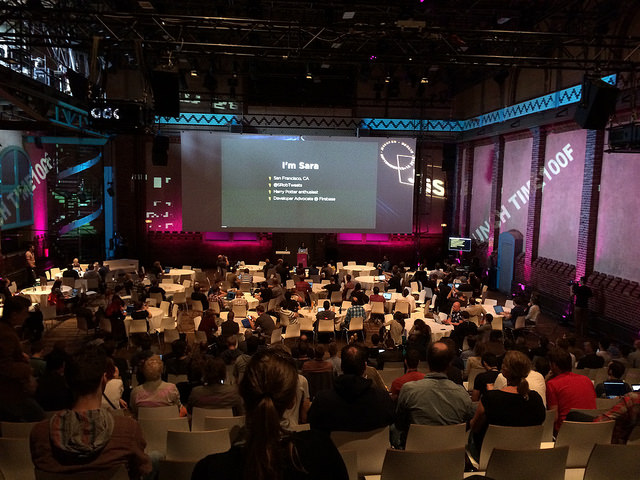
I love how speakers express and share their own experiences when interacting with a specific technology, design or philosophy. I remember how Ryan Florence manage to perform a drone back flip trick during his talk in EmberConf 2014. I remember how Jeffrey Zeldman describe his own facial features during his opening talk in An Event Apart San Francisco 2015. I remember how Jeffrey Veen cleverly lay out his talk outline that covers a surprisingly huge scope of topics into a 1-hour talk in Beyond Tellerrand Düsseldorf 2015. I remember how Andrew Sorensen did a mind-blowing live-coding session with western music using a language called Impromptu in Codemania 2015.
It's all in the details.
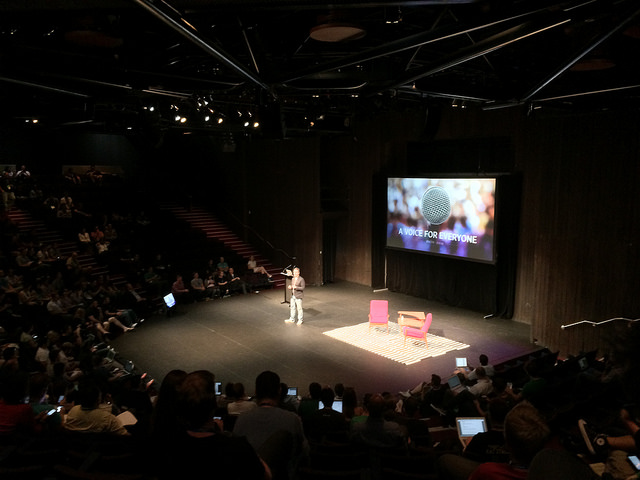
The good slides are simple and focused. Speakers prepare a lot in case the projector or Internet doesn't work. They repeat points over and over again to effectively deliver the message to the audience. Good speakers adapt to the culture and environment rather than forcing their own on the audience. They care about their talks and spend a lot of time to rehearse so that it's worth your time to listen to them. Some can be a bit demanding while some are concern whether they get paid. They are almost always at the back of the conference room, probably sitting on the floor, feeling a little nervous, still tweaking, adding and removing little details from their slides.
I'm always amazed by the level of details Chris Heilmann put on his slides and talks, especially now that I've seen his talk more than twice. It gets to the point where it's not just about the topic anymore but more on how the speakers paying so much attention to details in delivering the talk in the best possible way. Regardless of how many times they present the same topic over and over again in many conferences around the world. That effort is well worthy of respect.
The conferences
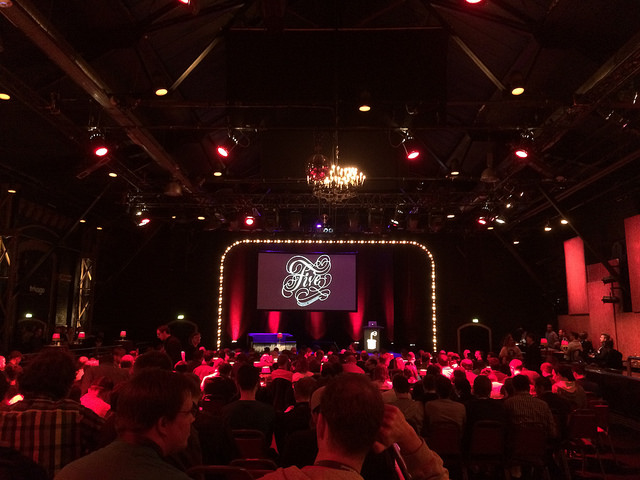
Not all conferences are organized the same way. Few things to expect from conferences would be swags like t-shirts, mugs and stickers. Some conferences offer more than those. JSConf.EU 2014 has a very, very cool opening. Some conferences like JSConf.EU and CSSConf.EU serve Club-Mate for the attendees and also provide live realtime transcription for all talks. Web Directions South gives out a Lindt Roasted Almond dark chocolate bar. RedDotRubyConf 2015 gives out a spork in a handy zipper bag which also acts as a swag pouch. An Event Apart San Francisco 2015 gives out colourful socks. JSConf.Asia gives out Photon, a tiny Wi-Fi development kit for Internet of Things stuff. ReactEurope even has its own conference mobile app for attendees to check-in and leave feedback. Beyond Tellerrand gives badges that includes your Twitter profile avatar, which is a nice touch in case people recognize you by your avatar. Beyond Tellerrand also remixes the speakers talks with music, and one that I like most is Sara Soueidan's talk.
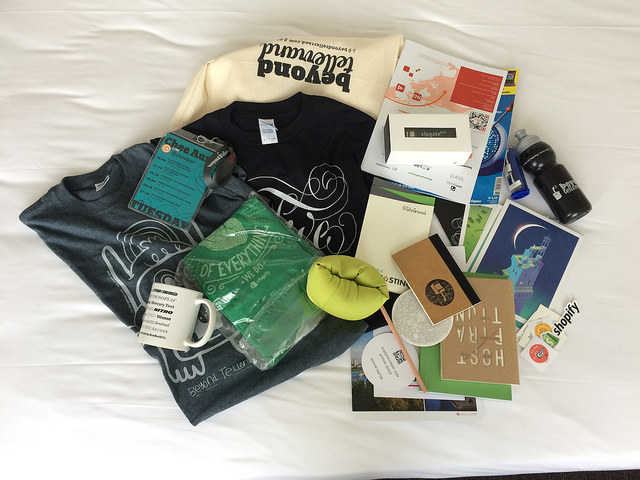
Some conferences print your name on both sides of the badge so that it won't be flipped to the wrong side while wearing it around your neck. Some conferences provide women's fitted t-shirts along with the unisex ones. Some conferences have extra activities like bingo, fold-an-origami, and online questionnaires or quizzes. Some have a short Q&A session after every talk. Some don't have Q&A sessions because they encourage people to ask the speakers directly, which would make the speakers feel less lonely.
The organizers
The organizers are the most important part. For me, going to a conference start to feel like reading a book. There's a story behind it on how the organizer start the whole thing and change things along the way until it ends.
It's ridiculously hard to organize a conference. To even understand this, I encourage people to start small and organize a local meetup, which technically is a smaller version of a conference, so it should be a bit easier.
Sometimes I don't even know where to begin. I guess it all starts with a few things like:
- Name of the conference. And you know, naming is hard.
- Location that is not expensive, easily accessible via public transports and can accommodate a lot of people.
- Date and time, because people need to plan their flights, stays and schedules.
- Sponsors, so that attendees wouldn't have to pay so much.
- Marketing and social media presence, so that people would know about it and think of attending or participating.
- Calls for participation (CFP) to get speakers, workshops, and exhibitors.
- Code of Conduct, because it's a legal liability.
- Accounting, just because.
That's pretty much it, from what most people see.
But wait, there's more.
- Who's going to design the logo for the conference? After the logo is done, how do you print the T-shirts and stickers? Are the t-shirts nice and worthy? How about badges and lanyards?
- Is it going to be a one-day or two-day conference? What if there are not enough speakers for a two-day conference?
- Is there a site that handles ticket registration? Can it generate discount code for students? How about diversity tickets and diversity support tickets? What happens when people want a ticket refund or transfer? What happens when PayPal "limits" your funds?
- When you have the location, who's going to set up the place? Registration booth, direction signs from outside to the conference hall, chairs, tables, lighting, speakers and microphones, projectors, adapters for the projectors, air-conditioning, exhibitor booths, video-recording setup, power plugs, and restrooms?
- Once you have the speakers, how do you schedule the speaker talks? Oh wait, you have to book the hotels and flights for them first, because they don't pay to speak. What happens when one of your speakers couldn't participate due to unforeseen circumstances? Also, set up a speakers dinner before the conference so that everyone knows one another. Another nice touch would be giving them local mobile phones with prepaid SIM cards.
- What kind of food are you going to serve for lunch? Perhaps a burger truck? Any vegetarian, vegan, gluten-free or halal options? Any baristas for the coffee breaks? Free beers, anyone? Where's the after-party?
- Before the conference, who's going to send last-minute details like map directions to the attendees? During the conference, who's going to manage the backchannel chatroom and the social media posts? After the conference, who's going to send feedback surveys to the attendees?
Some organizers decide to print sponsor logos on the lanyards. Some will project a conference wall on the screen and have DJs playing music in between the talks. I really appreciate the attention to details by the organizers when they purposely dim out the lights when a talk session begins so that it won't be glaring to the audience. Some might even think that the speakers need to see the projection of their own slides instead of keep looking at their backs, so they put a stage monitor.
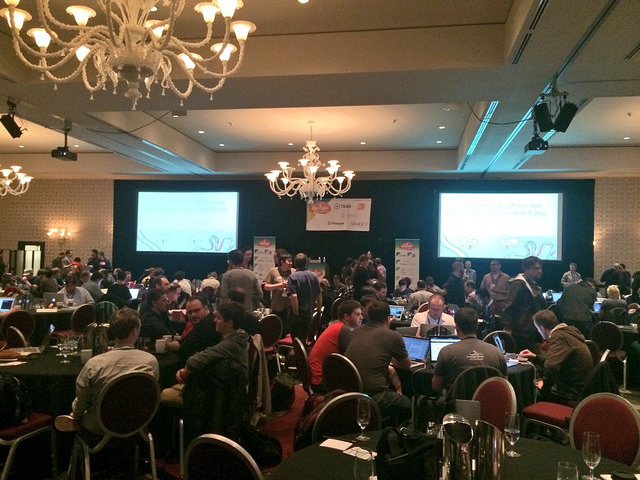
Being an organizer is hard. There are always things that you forgot or missed. Attendees might tell you that the air-conditioning is too cold or hot. Or the food is bad. Or the Wi-Fi connection doesn't work. Or the talks are boring.
When I go to conferences, I always try to put myself in the organizer's shoes. It's the moment when I feel like I'm part of the event and not judging the conference only from the talks. When I have the chance to talk with the organizer, I'll ask questions on how and why are things done this way and that way. I tremendously respect the organizers and it's great to show your appreciation by thanking them for organizing.
It's time
There are many reasons for attending conferences. There are many ways to find value in attending conferences. I'm not one of the speakers, just an attendee like everyone else. I don't see it as a 'business trip'. I don't see it as a waste of time and money. I pay for myself most of the time.
I see conferences in a different way. I see a very interesting story behind it. And I hope that more people can see it too.